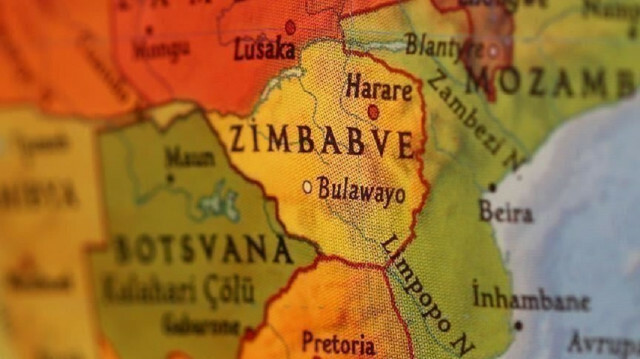
About 100 grinding mills, several hammermills and maize shellers are lined up at Kudakwashe Chivarange’s firm in Harare’s Mbare township in Zimbabwe, where he has set up his base.
Known as Chivaz Grinding Mills PL, since 2009, Chivarange’s indigenous firm has made headways even as Zimbabwe’s economy has struggled for decades.
-Thriving amid penury
Now Chivarange owns 10 shops across the country, selling grinding mills, hammermills and maize shellers, all manufactured at his Harare firm.
In fact, he stands out among hundreds of other Zimbabwean indigenous industrialists who have maneuvered past the country’s economic turbulence.
A lawyer by profession for seven years from 2000-2007, Chivarange said he worked as a legal officer at Haddon Motors, a local private company which was not spared by the country’s 2007 hyperinflation.
“Then Haddon Motors closed down due to the tough economic conditions. I then did a course in welding and fabrication, and after that, I then registered Chivaz Grinding Mills,” Chivarange told Anadolu Agency.
As a result, Chivarange now has 10 shops, starting with the first one in Harare, the Zimbabwean capital, then in Bulawayo, Gweru, Masvingo, two shops in Zvishavane and one each in Chiredzi, Ngundu and Karoi as well as Chinhoyi.
“On a good month, I produce 100 grinding mills, which are quickly bought by my customers, most of whom are farmers,” said Chivarange, who also claimed that he has employed 35 people at his firm.
With a single grinding mill fetching about US$1,200, this means he earns an estimated US$120,000 monthly in sales.
-Firms leading to more firms
Tobacco farmers, who have become seasonal customers for many indigenous grinding mill manufacturers like Chivarange, say they have benefited from the home ground entrepreneurs.
“I can’t complain surely because each tobacco selling season, I have made sure I buy at least three or four grinding mills for my own investments back in my rural home area,” 48-year-old Lawson Maungwe, a tobacco farmer based in Murewa, a rural district in Zimbabwe’s Mashonaland East province, told Anadolu Agency.
Apparently, Maungwe has also turned out to be another indigenous businessman here who against all odds has managed to set up a mini milling firm in his remote area, where he said villagers are coming from all walks of life to grind mealie meal.
-Black-owned firms now employers
Adam and Trymore Mudzipurwa, who are brothers, have also made a mark through their self-made firms in the capital Harare.
For five years now, 37-year-old Adam has been running his own car repair firm in Harare called Daylite Motors.
An auto mechanic by profession, Adam said he has employed nine mechanics at his firm, with others joining as interns posted from various training colleges to boost their practical skills.
Like Chivarange, Adam’s firm has withstood this country’s rugged economic terrain, and Adam said he has managed to make a difference in other people’s lives even so.
“I have people working for me. My firm is also managing to look after their own families, of course at a time when most people are unemployed,” Adam told Anadolu Agency.
His brother, 31-year-old Trymore, who followed in his footsteps, has also become one of Zimbabwe’s thriving indigenous entrepreneurs in the midst of penury, even as his firm is also operating amid a tough economy.
Even then, Trymore said he has become a proud employer of 14 people.
The owner and proprietor of Kimstan Enterprises, popularly known as DJ Tryazz, Trymore runs an events management firm and since 2017 has endured this country’s harsh economy, establishing a market countrywide where his services have over the past four years attracted many people.
“I’m an events manager, and I hire out entertainment equipment often to big events like weddings, rallies, churches. My company is also into cake making and video filming,” Trymore told Anadolu Agency.
Apparently, many indigenous firms like Chivaz Grinding Mills, Daylite Motors and Kimstan Enterprises have turned out to be growing backyard informal employers in Zimbabwe.
Owners of such firms like Chivarange, Adam and Trymore are basking in the glory of success, even as the country’s major foreign-owned companies are shutting down.
-Hyperinflation brought Black entrepreneurs
Since the hyperinflation era which clobbered the country around 2007-2009, hundreds of foreign-owned firms shut down, paving the way for indigenous firms which have had to endure a hostile economic climate.
According to economists here, only indigenous owned firms have managed to survive Zimbabwe’s comatose economy.
-Black firms adaptive
“I think the biggest advantage that local businesses have over foreign businesses is that they have local knowledge, local expertise, local networks. They are actually able to adapt better to the challenging local economic environment than foreign investors,” Prosper Chitambara, an economist at the Labour and Economic Development Research Institute of Zimbabwe, told Anadolu Agency.
So even as many formal companies are closing down owing to the country’s failing economy, many firms like the ones run by Chivarange have stood the test.
“As a company, we have discovered that one of the few reasons why our economy is always down is because Zimbabwean business people shy away from manufacturing or production, and so we are tapping into that gap,” said Chivarange.
To this, Chitambara said local investors have no other option but to adapt to the local environment or the home environment.
“Normally, local investors tend to adapt better than foreign investors because foreign investors can be very sensitive. No investor would want to invest in an environment that is highly uncertain and turbulent. So that becomes a challenge when the environment is not stable for a foreigner to invest,” he said.













